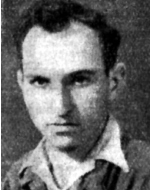Lebanon, Zvi
Son of Pnina and Dov Kalich, was born on September 9, 1922 in Safed, a descendant of a family of Hasidic rabbis who had lived in Israel for four generations. As a boy, his family moved to Beirut, the capital of Lebanon, where she spent five difficult years until she returned to her homeland and settled in Tel Aviv. Since he was first in French, he continued to study at the Alliance school, and by the time he was 14, he began to work in a framework. This way of life brought him to Hanoar Haoved, and since then his life has been devoted to fulfillment and protection, like any pioneering Hebrew youth. When he was 15 years old, he went to the hachshara in Gvat, adapted well to work and liked everything. Afterward he continued to work in Alonim, Giv’at Brenner, Aynot, and finally in Revivim, where he established his home. He moved to Jerusalem and worked in the Technical Department of Hadassah, where he joined the security forces and was returned to Hadassah for protection and protection. A few days before the caravan disaster in Sheikh Jarrah, he returned to the city on holiday with his family, but he did not attend his wife’s pleas, claiming that he had to return immediately to Mount Scopus as he was about to assume the role of responsible commander: “All my friends are gone and I am still On vacation, “he told his wife, and left, and the road to Mount Scopus passed through the Arab neighborhood of Sheikh Jarrah. When the war broke out, the movement was allowed to mount convoys secured by The British Army On the morning of April 13, 1948, a convoy left for Mount Scopus after the British promised the road was open and safe, and the convoy encountered an Arab ambush in the Sheikh Jarrah neighborhood and hundreds of Arabs, An ambulance and an armored escort were caught in an ambush for many hours, and the convoy tried to prevent the Arabs from approaching the vehicles, which were fired from our positions in the city and Mount Scopus, as well as armored vehicles who were sent to the area, were unable to assist the convoy. To them. In the afternoon, the Arabs managed to set fire to two buses on their passengers, and only late in the evening did the British intervene and rescue the survivors from the trapped vehicles. The only passenger who took advantage of the car in which Tzvi was traveling said that he saw him standing next to the driver and pleasantly encouraging the passengers: “Help will come, you can not come …” He was brought to eternal rest in a cemetery in Sanhedria.
